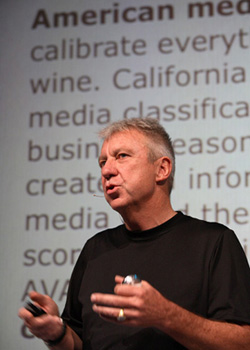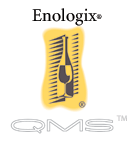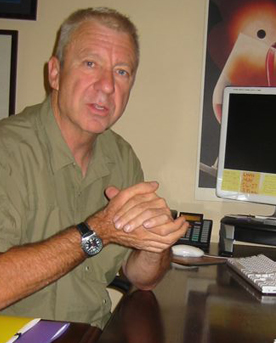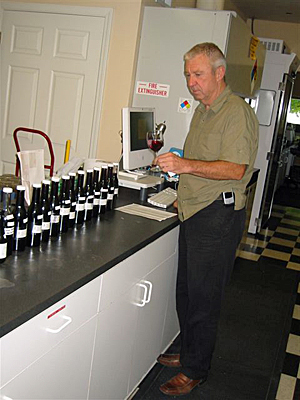

Wine consultant Leo McCloskey's company, Enologix, analyzes mountains of data to advise wineries about how to make high-scoring wines.
[Image courtesy of www.taste3.com]
California (State Appellation)
Leo McCloskey is against wine scores...
...but for a fee will tell you how to obtain high ones.
Part 1 of a 2-Part Series
by
Alan Goldfarb
July 24, 2007
And here we all thought that McCloskey - the founder of the Sonoma, Ca. company Enologix that was formed to help producers “understand how ratings are good for the consumer” - was the industry’s frontman in its quest to chase ratings. More specifically, the coveted 90-plus score that Americans seem to lean on for their buying decisions, like a marionette that relies on its strings.
McCloskey readily admits that what Enologix does and has been doing since the company was started is to collect data, beginning in 1990, on 90-plus scoring wines by certain critics; and to track the progress of a winery’s grapes from the vineyard to the bottle in order to advise it what to do in order to capture the holy grail.
Additionally, according to the company’s Web site, Enologix “offers quality metrics, software tools and consulting which allow wineries to protect wine quality …”
Naturally, he scoffs at characterizations that writers, and even those in the industry, have put on him such as calling what he does, “The Grapes of Math,” or “something akin to reducing love to an algorithm.”
 When pressed to admit that he indeed promulgates scores, McCloskey answers, “No, no. I’m just not against scores. That’s a big difference. I’m for the wine farm. I’m for running it as a business. I’m for being consumer-action oriented. Scores are just a temporary thing to be against in a consumer market.
When pressed to admit that he indeed promulgates scores, McCloskey answers, “No, no. I’m just not against scores. That’s a big difference. I’m for the wine farm. I’m for running it as a business. I’m for being consumer-action oriented. Scores are just a temporary thing to be against in a consumer market.
“It’s one of many features in the market. … I’m just saying, that to take a stand and talk all day against scores, and not be active in your wine property, I think that’s the problem in the American wine industry.
“…I think to have an open culture, a performance culture, is what it’s all about. If scores are being used by the consumer, I like to compete. I like it when people win. I wish well on my neighbors.”
When charged by this reporter that because of the quest for high scores , McCloskey is somewhat complicit in the trend toward homogenization and a culture of big wine, he answers:
“It’s so untrue… (But) I tend to agree with you (about these big wines), but for different reasons. … Don’t throw it at me. I would throw it at other malaise within the industry. Those are the forces of mass production. When you look at true homogenizers, it’s the people who voted for cross-blending between AVAs. It’s those people who want to use de-alcoholization. It’s those people who want to use concentration. It’s those people who are using oak chips. I could go on. (It’s) the addition of technology equipment and additives, which are not coming strictly from grapes.”
But Steve Edmunds, the winemaker for Oakland, CA-based Edmunds St. John, disagrees. In a response to a New York Times article about McCloskey a couple of years ago, Edmunds wrote, “I think (his) approach to winemaking is appalling. Whether it works for the wineries in question or not, it's not about making better wine; it’s about selling more wine.”
McCloskey, an extremely bright and affable fellow of 57, actually seems to relish the controversies he’s stirred up. But he’s cautious about the agenda of some writers who approach him. Before he would agree to my turning on a tape recorder for this interview, he asks if we could rehearse the gist of the questions. However, the topics settled upon were varied, and the discussion flowed organically.
“Wading into controversies that already exist in the wine industry is where I would like to position the discussion of Enologix,” he begins, as if by caveat.
But it seems clear that McCloskey is intent on steering our meeting in the direction of quality and how to ensure systemic controls; and that Enologix has
Leo McCloskey in his office at Enologix.the wherewithal to guide the debate that would be sure to ensue. Because, as he says many times during our time together, as if by a mantra, “there is a culture of cover-up” in the wine industry.
His lengthy explanation of the obfuscation goes thusly:
“What I have been presenting to the wine industry is a quantitative approach to appellations. What I can show you, consistently and routinely, is that data related to consumer purchases of wine, is related to quality in (a given) appellation.
“Let’s take Napa Valley. This is the walled city of wine in the new world. Napa is the only appellation that has turned into a brand. People on the streets of Paris know where Napa is. They do not know where Sonoma is or Lake County. Lake County could be in Minnesota, for a Frenchman.
“It’s the benchmark by which all the Cabernet Sauvignon within the U.S. is judged … because Robert Mondavi and the growers of Napa created the benchmark by which to judge wines in terms of bottle price, sales, appellation, and national critics’ scores.
“Within this brand, there is high and low quality,” he continued. “The highest quality certainly deserves a lot of recognition … (But) if you take the poor areas of Napa, they’re rejected as soundly as the poorest regions in Sonoma County. I would say the lowest quality regions of Napa have been covered up.
“The culture of the cover-up is the entrepreneur’s culture in America. American men have a kind of republican idea. They want unlimited freedom in business. They want to do what they want to do without governmental regulations; and without peer regulation. They are against having their peers out them for any low quality.”
Furthermore, “I believe that to strengthen Napa Valley is to point out where the poor quality Cabernet comes from in Napa. … So, I’m just proposing honesty.”
Enologix, which he said has 50 to 60 clients who each pay him an average of $20,000 a year to guide them toward higher scoring wines, is, incidentally, beginning to sell stocks seeking to raise capital, some of which no doubt would go toward its helping to form those AOCs.
“I’m for those appellations that have organized themselves around the benchmarks by which we judge all appellations. Namely the European
At the Enologix lab, Leo McCloskey assesses firsthand the quality of a Cabernet. appellations (which are) more tightly legislated in respect to genetic material and
McCloskey readily admits that what Enologix does and has been doing since the company was started is to collect data, beginning in 1990, on 90-plus scoring wines by certain critics; and to track the progress of a winery’s grapes from the vineyard to the bottle in order to advise it what to do in order to capture the holy grail.
Additionally, according to the company’s Web site, Enologix “offers quality metrics, software tools and consulting which allow wineries to protect wine quality …”
Naturally, he scoffs at characterizations that writers, and even those in the industry, have put on him such as calling what he does, “The Grapes of Math,” or “something akin to reducing love to an algorithm.”
 When pressed to admit that he indeed promulgates scores, McCloskey answers, “No, no. I’m just not against scores. That’s a big difference. I’m for the wine farm. I’m for running it as a business. I’m for being consumer-action oriented. Scores are just a temporary thing to be against in a consumer market.
When pressed to admit that he indeed promulgates scores, McCloskey answers, “No, no. I’m just not against scores. That’s a big difference. I’m for the wine farm. I’m for running it as a business. I’m for being consumer-action oriented. Scores are just a temporary thing to be against in a consumer market.
“It’s one of many features in the market. … I’m just saying, that to take a stand and talk all day against scores, and not be active in your wine property, I think that’s the problem in the American wine industry.
“…I think to have an open culture, a performance culture, is what it’s all about. If scores are being used by the consumer, I like to compete. I like it when people win. I wish well on my neighbors.”
When charged by this reporter that because of the quest for high scores , McCloskey is somewhat complicit in the trend toward homogenization and a culture of big wine, he answers:
“It’s so untrue… (But) I tend to agree with you (about these big wines), but for different reasons. … Don’t throw it at me. I would throw it at other malaise within the industry. Those are the forces of mass production. When you look at true homogenizers, it’s the people who voted for cross-blending between AVAs. It’s those people who want to use de-alcoholization. It’s those people who want to use concentration. It’s those people who are using oak chips. I could go on. (It’s) the addition of technology equipment and additives, which are not coming strictly from grapes.”
But Steve Edmunds, the winemaker for Oakland, CA-based Edmunds St. John, disagrees. In a response to a New York Times article about McCloskey a couple of years ago, Edmunds wrote, “I think (his) approach to winemaking is appalling. Whether it works for the wineries in question or not, it's not about making better wine; it’s about selling more wine.”
The Fingerprints of 50,000 Plus Wines
By having at his disposal the fingerprints of more than 50,000 wines, McCloskey insists that his raison d’être is all about quality. And as if to leave on the backburner the issue of chasing the score, McCloskey seems obsessed now with promulgating the efficacy of wine quality.McCloskey, an extremely bright and affable fellow of 57, actually seems to relish the controversies he’s stirred up. But he’s cautious about the agenda of some writers who approach him. Before he would agree to my turning on a tape recorder for this interview, he asks if we could rehearse the gist of the questions. However, the topics settled upon were varied, and the discussion flowed organically.
“Wading into controversies that already exist in the wine industry is where I would like to position the discussion of Enologix,” he begins, as if by caveat.
But it seems clear that McCloskey is intent on steering our meeting in the direction of quality and how to ensure systemic controls; and that Enologix has

Leo McCloskey in his office at Enologix.
His lengthy explanation of the obfuscation goes thusly:
“What I have been presenting to the wine industry is a quantitative approach to appellations. What I can show you, consistently and routinely, is that data related to consumer purchases of wine, is related to quality in (a given) appellation.
“Let’s take Napa Valley. This is the walled city of wine in the new world. Napa is the only appellation that has turned into a brand. People on the streets of Paris know where Napa is. They do not know where Sonoma is or Lake County. Lake County could be in Minnesota, for a Frenchman.
“It’s the benchmark by which all the Cabernet Sauvignon within the U.S. is judged … because Robert Mondavi and the growers of Napa created the benchmark by which to judge wines in terms of bottle price, sales, appellation, and national critics’ scores.
“Within this brand, there is high and low quality,” he continued. “The highest quality certainly deserves a lot of recognition … (But) if you take the poor areas of Napa, they’re rejected as soundly as the poorest regions in Sonoma County. I would say the lowest quality regions of Napa have been covered up.
“The culture of the cover-up is the entrepreneur’s culture in America. American men have a kind of republican idea. They want unlimited freedom in business. They want to do what they want to do without governmental regulations; and without peer regulation. They are against having their peers out them for any low quality.”
Furthermore, “I believe that to strengthen Napa Valley is to point out where the poor quality Cabernet comes from in Napa. … So, I’m just proposing honesty.”
The Art and Science of the High Wine Scores
Toward that end, McCloskey is offering up Enologix, with its extensive data base, as the arbiter of rating quality in sub-regions of various AVAs. He wants to form an AOC-style system (the French call it appellation contrôlée), which would act as a cartel with its own ratings.Enologix, which he said has 50 to 60 clients who each pay him an average of $20,000 a year to guide them toward higher scoring wines, is, incidentally, beginning to sell stocks seeking to raise capital, some of which no doubt would go toward its helping to form those AOCs.
“I’m for those appellations that have organized themselves around the benchmarks by which we judge all appellations. Namely the European

At the Enologix lab, Leo McCloskey assesses firsthand the quality of a Cabernet.










 READER FEEDBACK: To post your comments on this story,
READER FEEDBACK: To post your comments on this story,




